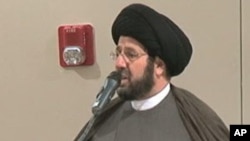U.S. combat forces in Iraq are now at their lowest level since 2003. The end of Operation Iraqi Freedom August 31st marks a new phase for the remaining 50,000 U.S. troops, which will support the Iraqi Security Forces. But Iraqis in the U.S. have mixed feelings about the changing role of U.S. forces.
Hashim Al-Tawil is a professor of Art History at Henry Ford Community College in Dearborn, Michigan. Originally from Iraq, Al-Tawil served on the faculty of the University of Baghdad in the 1970s and 1980s. Back then, the art and culture scene thrived in his home country.
Now, he says, it is mostly gone, either looted after the war or destroyed by years of instability, despite the U.S. troop presence.
Watch Farabaugh's Report:
"The Iraqi people have a very high level of education. They have a reasonable, modern way of life. They are tolerant, they are pluralistic, they are multi-cultural. All this is gone now. It has been destroyed. The good people had to flee Iraq," he said.
Many who fled Iraq have resettled in Dearborn. The Karbala Islamic Education Center, led by Imam Husham Al-Husainy, serves as a meeting point for many Iraqis in the region.
Imam Al-Husainy says many in his congregation are tired of the war and destruction in Iraq. "I think this last several years maybe was enough for a lot of Iraqis to think that enough is enough, and the multi-coalition army had enough time to do what they want to do, to do what they can do, there is no more things they can do," he said.
Another meeting point for Iraqis in Dearborn is the Islamic Center of America, the largest mosque in North America. Imam Sayed Hassan Al-Qazwini leads the congregation at the Center. He says while many Iraqis at his mosque would like to see all U.S. troops depart Iraq, they are concerned about what would fill the vacuum. "People are afraid that a sudden departure of the foreign troops may lead the insurgents to strike back and try to upset the situation in Iraq, especially that we realize after almost six months of having a national election, Iraqi politicians have not been able to reach a conclusion on who would form a government," he said.
The top U.S. Military official, Chairman of the Joint Chiefs of Staff Admiral Mike Mullen, shares those concerns about the political situation. Speaking to reporters in Chicago, he insists it will not change the size of the U.S. military in Iraq.
"We need, and the Iraqi people are calling for, this government to stand up so they can move forward as well. So in terms of the transition and the number of troops, while we watch it very carefully, we are still on the plan we were that we laid out many months ago," he said.
That plan calls for the remaining 50,000 U.S. forces stationed in Iraq to provide support to the Iraqi Security Forces.
But despite the drawdown, Iraqis like Al-Tawil - who has not been to Iraq in 20 years - still do not feel safe enough to return to visit, much less to live. "Iraq is not functioning anymore. There is no government. There is no unity among the people. You look at Baghdad and you feel like you are in Palestine with all these concrete walls. This is not the Baghdad I know," he said.
The last U.S. combat units left Iraq in mid-August. A security agreement between the United States and Iraq calls for the withdrawal of the remaining fifty thousand troops by the end of 2011.





